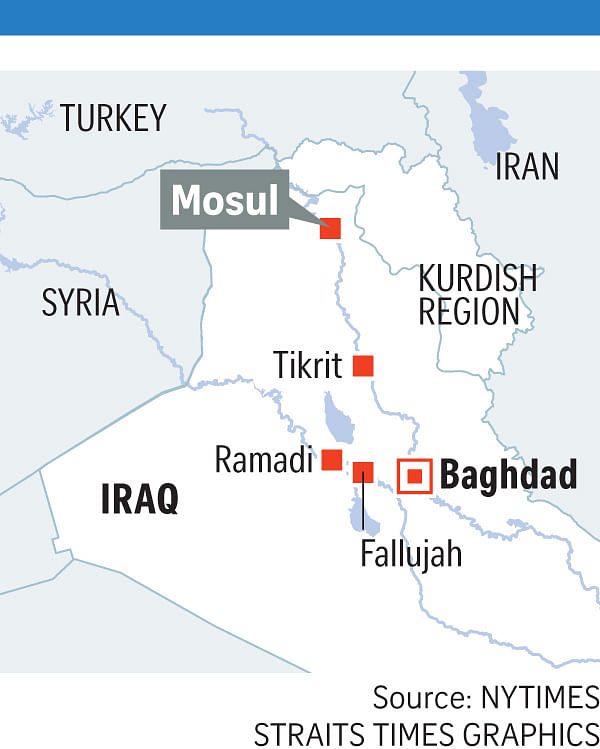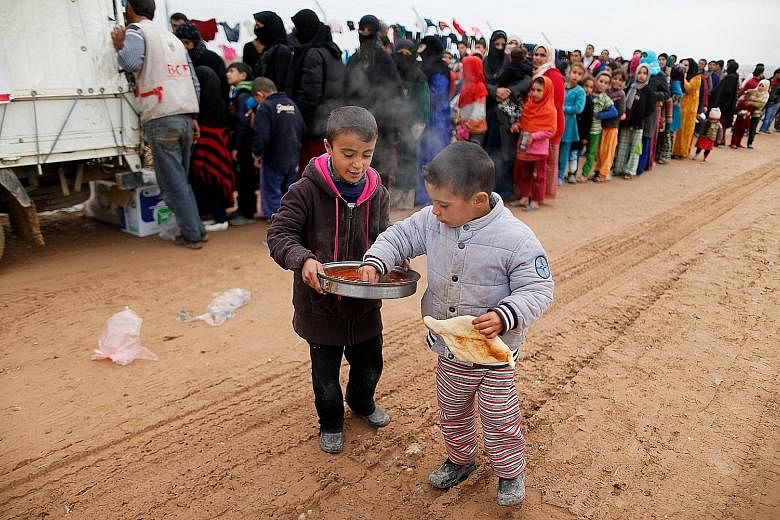ISTANBUL • After two months, the battle to retake the Iraqi city of Mosul from ISIS has settled into a grinding war of attrition.
The front lines have barely budged in weeks. Casualties of Iraqi security forces are so high that commanders heading the United States-led air campaign worry that they are unsustainable.
Civilians are being killed or injured by Islamic State in Iraq and Syria (ISIS) snipers, and growing numbers of suicide bombers.
As the world watches the horrors unfolding in Aleppo, Syria, a different tragedy is emerging in Mosul. Up to 1 million people are trapped inside the city, running low on food and drinking water and facing the worsening cruelty of ISIS fighters.
"ISIS members have become like mad dogs, and every member has the power of immediate execution," Mr Abu Noor said by telephone from his home on the west side of Mosul, which government forces have not reached.
As the fight drags on, it seems more likely that Mosul will become one of the first national security issues facing US President-elect Donald Trump when he takes office next month. While US forces have largely steered clear of the fighting in Syria, they are deeply involved in operations in Iraq, mainly in training, advising and support roles.

Senior US officials say the brutal urban fight for Mosul is succeeding - however slowly - but is proving to be tougher than expected. These officials predict that the battle for Iraq's second-largest city could last two to four more months.
Mr Brett McGurk, President Barack Obama's envoy to the international coalition fighting ISIS, noted recently that previous battles against the terror group, as in Fallujah, in Iraq, or Ramadi or Kobani, in Syria, took months, and that eventually ISIS would exhaust its supply of munitions and fighters.
The battle for Mosul has shaped up unlike any other in Iraq.
As Iraqi forces advanced, they uncovered bomb-making facilities stunning in their sophistication, indicating that it could be a long time before ISIS runs out of arms.
Tens of thousands of armaments have been produced, Conflict Armament Research, a London-based organisation said, with "a robust supply chain extending from Turkey, through Syria, to Mosul" .
Mr Shakir Mahmood, a soldier in Iraq's elite counterterror forces, fought in battles in Ramadi, Fallujah and Tikrit, but they were nothing like the fight in Mosul, he said.
"They have so many snipers hiding in the houses among civilians, and also many car bombs. Our losses in this battle cannot be compared with the other battles," he said.
Another veteran soldier Ibrahim Ali said: "I have seen things in Mosul that I will never forget my whole life. I have seen entire families get killed because of ISIS car bombs."
The Iraqi government does not release figures of military casualties, but it is clear they are worrisomely high. Civilian casualties are also soaring, even though the government dropped millions of leaflets over the city with instructions to residents to stay inside their homes. Most civilians did, but those who fled faced harrowing journeys, and many have been killed or maimed by crossfire. That so many civilians have remained has also hampered the fight.
"They don't have the capability to evacuate all these civilians, and so that's limiting the amount of firepower they can use in the city," said Mr Carl Castellano, a senior analyst at Talos, a consulting firm that focuses on security in Iraq.
For those who did stay home and whose areas are now liberated, there are new challenges, and fears.
"The government forces said stay in your houses, but our houses are without electricity or water," said Mr Sabah Kareem. "We are amid hell. We don't know when we will be bombed, or if ISIS will return to kill us."
NYTIMES

